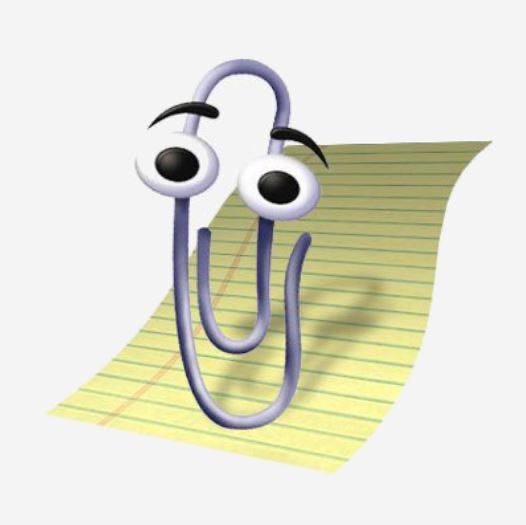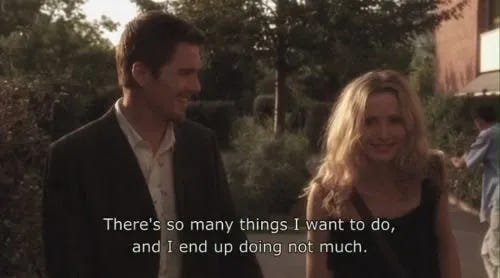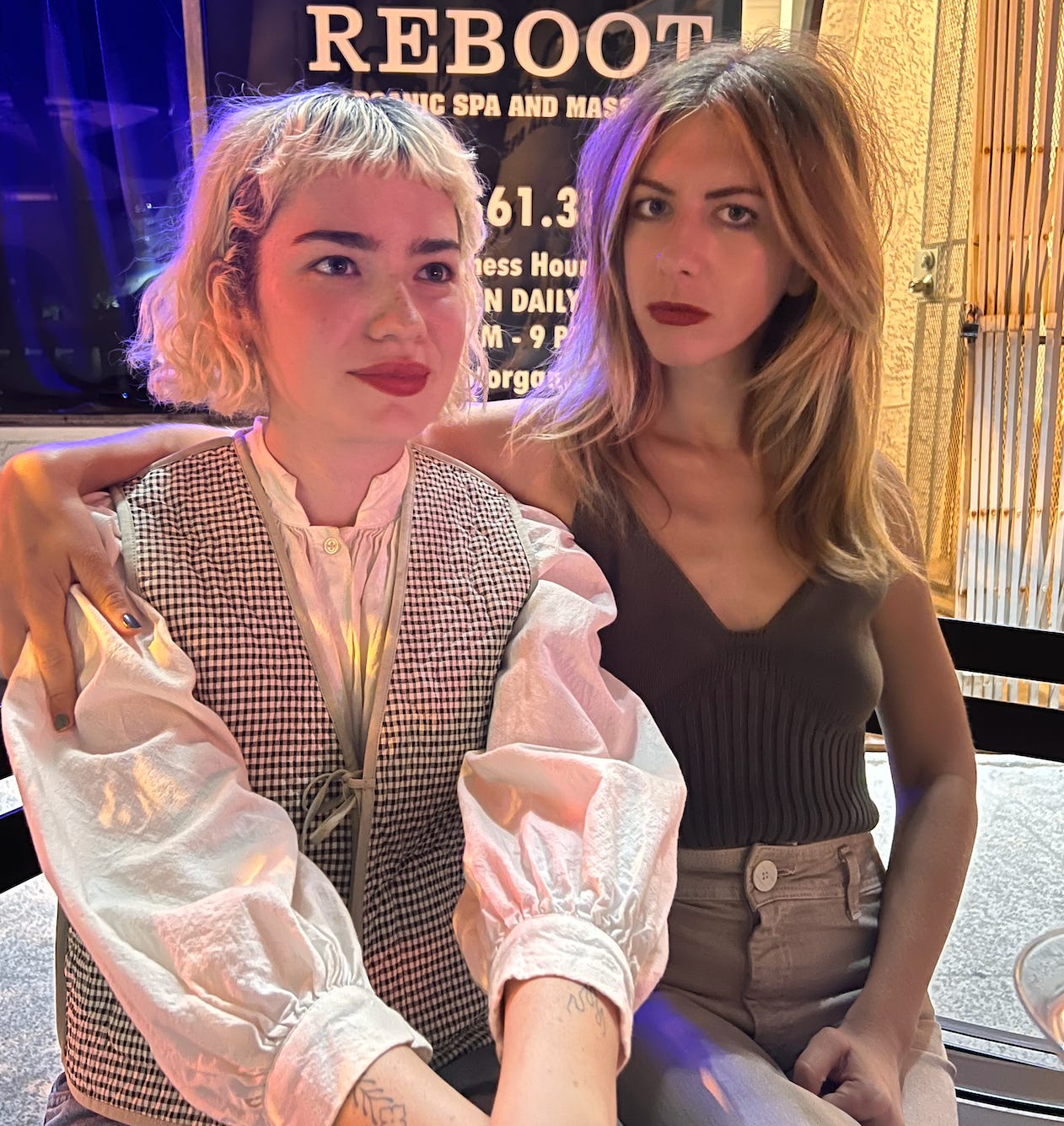drafts backup overwhelm
chronic creative constipation & 11 ways out of the back up!
Overwhelm, for me, often stems from having an abundance of ideas but lacking the time or energy to act on them. The longer I linger in the liminal space between idea and action the more frustrated I become. However, I believe we’re meant to feel that way, since we’re hardwired to move away from pain and towards pleasure, so the discomfort from inaction motivates us to make progress to alleviate the pain.
I try to see this creative discontent as useful, albeit uncomfortable, but staying there too long is depleting. Having to hold onto unexpressed ideas forces us to juggle them, along with new ideas, and every other responsibility we have.
A couple months ago during a stretch where I felt particularly stuck, I told Madelynn De La Rosa that I hadn’t completed anything in weeks. The supportive friend she is, she’d noticed a pattern that only a close friend could:
“You know when you copy text?”
I nodded.
“Well you can’t copy anything else until you paste what you have,” she said.
She equated this sensation of cut-but-unpasted text to my overwhelmed feeling.
“All these drafts are just floating and you need to paste them,” she said. “The stress comes from having to hold onto them all without losing them.”
She’s right: I sit on drafts for months, overthink, redo them, until the edits I’m making only make them worse. The farther away I get from the original spark, the more it loses its luster.
Unlike me, Maddie’s quick to take an idea and share it. For instance, last week, she shot a video in several locations, edited it, and posted it in the same day. Observing her contrasting “pace of pasting” unlocked my desire to attempt to move in her direction of being quicker to release an idea (paste what’s cut).
But could I? Perhaps this was innate to her… and people like me who tend to have more drafts than published work are doomed to create at this glacial pace?
I hoped not because this slowness often leads to creative constipation—an unpleasant sensation that I wrote about here. Being creatively backed up occasionally is natural—it happens due to time restrictions caused by our relationships, careers, environments, and our mental and physical health. But when these backups become chronic, like they have for me, that’s when it’s useful to seek a solution.
I’m not alone in this creative condition: I’ve observed several similar cases in the clinic, and it’s one of my favorite issues to help people navigate in their process. Each situation is different with a unique solution, but universally making cuts and setting deadlines usually help.
This sounds easier than it is; people who tend to be “draft people” like me aren’t going to magically become “quicker creators” like Maddie overnight or maybe ever…
I believe that we can create at a quicker pace if we want to because there have been periods where I’ve “pasted quickly.” It’s been a while but not long enough to forget how good it felt, so I tried to reverse engineer how that happened. Of course there are several variables at play, including mental and physical health and interpersonal issues, but beyond those, my output has been quicker as a result of being forced to hurry up—by external deadline.
There’s never going to be enough time but there’s also often too much time. There comes a point in some projects where there’s not a clear end so instead it’s just choosing to stop— which is usually when another project is knocking.
So in an effort to not keep ideas waiting at our creative doors… the list that follows contains advice I give myself when I’m buried alive under a drafts mountain.
I hope they are helpful to you too but, as always, take what you like and leave the rest. And feel free to comment what helps you with this issue. Or if you don’t have this issue and you relate more to Maddie, great—what’s your secret?
And if you relate to me, as someone who typically takes longer between cutting and pasting, does this tendency make you feel a frustration best articulated by Julie Delpy in Before Sunset?
With the anxiety that feels like homework hanging over my head at all times, I’m distracted constantly. And without the dopamine hit that comes from handing something in, completion, publishing, and feedback—it’s difficult to gain enough momentum to see things through.
With unexpressed ideas (drafts) and tasks needling at us as they get moved from to-do list to to-do list, we clutch onto them. But would it be a relief if we lost them?
Which brings me to #1 on the list….
11 WAYS OUT OF CREATIVE CONSTIPATION :
Kill darlings… RIP ideas you used to love and perhaps still do. 💀 Often holding onto several half-done ideas is blocking me from finishing any. This letting go is even more difficult if you have made a bit of progress on something because you feel like you will have wasted time, i.e., sunk cost fallacy. But this just becomes baggage you are carrying around. You are holding onto all those ideas, trying not to drop them, while new ones are being tossed at you. Plus, you have to carry your life, work, chores, relationships, etc., so now you are juggling too many balls. But if you set down the old ones, you will feel some relief having one less ball in the air.
The longer it takes to kill old ideas clogging your creative pipes, the longer it takes to push projects forward.
I’ve never been good at this… but it may be my Achilles heel so I’m trying to be better. ☠️ If they’ve lost the spark, they gotta go. Later Darling!
Tell yourself you can do some rather than none. And you can do it badly, meaning write the essay poorly…this will get you a draft rather than a floating idea. WRITE IN ALL CAPS. Do anything to get going. As Melissa Broder says, with writing you have to make your own clay (words), which you can then mold (edit) later but you need to make yourself something to iterate from.
Don’t use a new project to procrastinate from the messy middle of another. Yes, you want to catch a new idea and execute it while it’s fresh so you don’t have to hold it or forget it. But just write it, mark it, and it will come back intact or better when you finish your other ones first. Or it wasn’t that good of an idea. Don’t let yourself start one new idea before you bring another to completion, including sharing and marketing it, because you will just feel frustrated with another half-started project rather than the dopamine release you could feel finishing something.
Contribute work as much as you consume others’ work. Stop looking at others’ IG or work until you are contributing as much as or more than you are consuming. Try to keep the ratio between these two even.
For me at least, I’ve found that a terribly unbecoming feeling of resentment builds when I see pals sharing their work if mine remains stagnant for too long, whereas when I, too, have made at least some creative progress, I’m genuinely stoked to see anyone around me also creating.
Related: stop taking in everything, until you spit out something. This means to cease consuming content that inspires you and keeps you company—which is a huge bummer. I want to keep myself distracted and overstimulated but, if I do so, I’ll remain numb to creative discomfort that pushes me to complete something.
This even includes self-help or spiritual inspiration
too, meaning I need to live life more before I try to improve it. It’s important to integrate what I’ve absorbed or learned before consuming more. Self-help is only helpful when applied; without integrating it, it’s just entertainment.
Keep some empty space in your calendar so you can make progress on spur-of-the-moment projects as they come to you, occasionally at least. You never know when that will happen, but it will, so keep some time open for it to occur. You will always have to push projects aside if they hit when you’re in the middle of something, but if you occasionally can strike while they’re fresh, that’s ideal. And the more open space you have in your calendar the more likely that will be possible.
Manage your energy, not your time. Energy and time don’t always coincide, meaning you could have all the time in the world, but without the energy when inspiration hits, it’s just going to sit there, copied and not pasted, needling at you to hold onto it and not lose it.
Try to take care of yourself energy-wise, meaning surrounding yourself with people and activities that fill you up rather than drain you. If you’re an introvert, make sure you have enough solitude. Of course this isn’t always in our control but try to as much as possible. Take salt baths, long walks alone, etc.
Develop a system to catch ideas. When you can’t take action immediately, and often you can’t work on a project exactly when you feel moved to, the key is to capture it. Get it down including the excitement it made you feel.
Strike while the iron is hot when possible. Do tasks immediately when you have the ping to do them if you can. Don’t even put it on the to-do list, just do it as often as possible. Prevent getting stuck by cranking out tasks when your time and energy stars are aligned.
Know your patterning. Admit that this is an issue. Consider why? Can you identify a root cause? Some potential reasons for a chronic (longer than a week or two) creative backup include: genuinely not having the time, space, resources, solitude, collaborators, or equipment to progress your projects, or because you are a perfectionist, or because you need to tend to another area of your life right now that’s more urgent. I wish the answer was as simple as:
“Just do it.”
“Eat the frog.”
“Done is better than perfect.”These never worked for me long term. I tried them all… what does work is… looking under the hood of what’s going on in my life to understand where there’s a blockage that’s causing me to disappoint myself at the end of each day when I don’t complete the tasks I set out to. It could be something emotional or physical, but usually there’s a reason or pattern that can be identified with some contemplation. And if you can’t get to it with self-reflection alone, this is where a good friend, partner, advisor, coach or therapist can help.
Be gentle with yourself, even if tasks take you forever. If you’re bad at scoping how long tasks will take or too time-optimistic about what you can get done in a given amount of time, it’s okay. Try to be better, but beating yourself up about it doesn’t help.
Time is limited: no time to hate yourself anymore, better to get up and try to make things…
Would it be useful to accept and, dare I say, embrace the reality that you may in fact be a life-long, long-term-drafts-person? Or maybe the answer is to hit some deadlines? Honestly not sure… what do you think?
(As I’m typing this I am avoiding a newsletter I’m halfway done with by starting this one. Clearly, I need this advice more than anyone as I disobeyed #3. But there’s nuance to all of this… sometimes procrastinating one task with another isn’t the worst idea… if you complete a low-hanging fruit type of project, it might give you some momentum to do more.)
So take all of this with a grain of salt and I hope something was helpful.
Love,
KD
PS.
In this week’s episode with my favorite author Melissa Broder, we talked a bit about her process with this in terms of writing consistently. And last week with Verônika we talked about all of this in terms of how I used PIVOT as a low-hanging fruit for momentum… as well as a related question from this newsletter’s muse herself: Maddie (!!). Maybe we can talk more about this topic next time she does the podcast. I will ask her then if she’s always been a quick-to-paste-what-she’s-copied type of person, or if it’s something she learned. It may be inherent, but I sure hope it can be learned because in the moments I have been that way it’s more pleasant.









Katie, this article is so so helpful! My mantra when I get into this space - of wanting to perfect and edit and re-edit until the cows come home - is to say “good enough is enough”. It helps take the pressure off, even if my mind is like “this paragraph is shit, this could be better etc etc” because there’s ALWAYS something I could’ve improved on. And usually in the end, it feels good to publish and people never point out what I thought “could be better”
This piece landed in my inbox on a day I really needed to work on something I’d been resisting finishing. It reminded me that my struggles aren’t even a little unique, and I can just put on my editor hat and get the darn thing off my plate. It worked! And I got back the life force that had been tied up in my unfinished work. Thank you!!